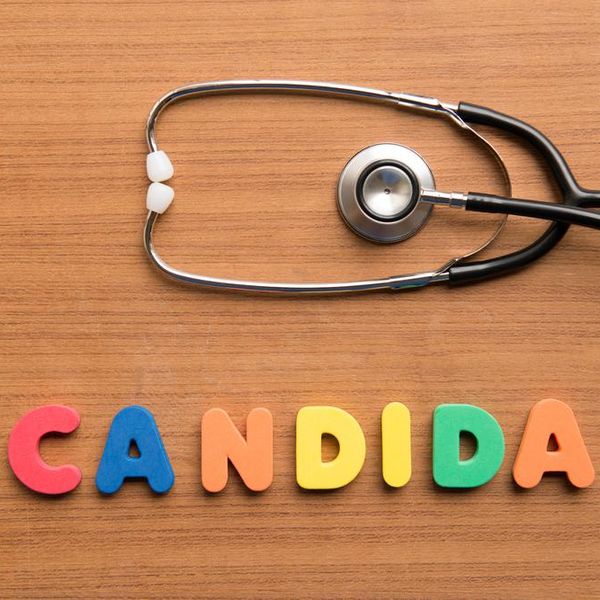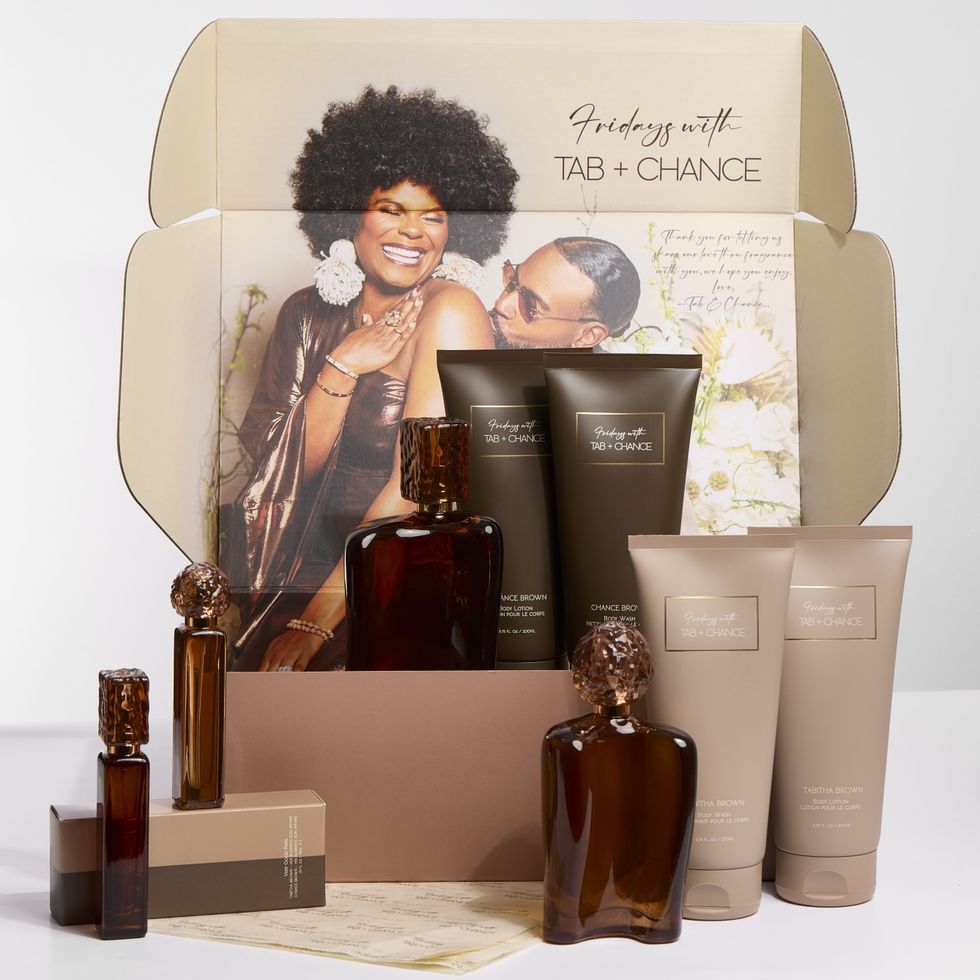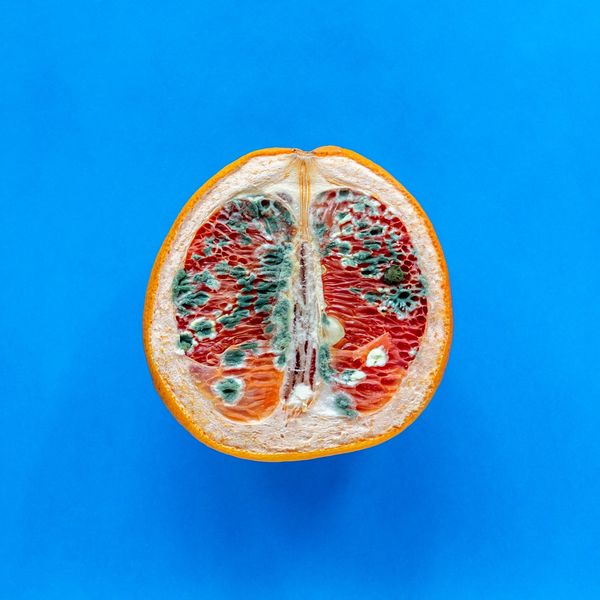
Although, thankfully, I've always had pretty good health, something that I constantly have to stay on top of is my fungal sensitivity. It's the reason why I am more vulnerable to getting yeast infections. It's why I once got tinea versicolor on one of my feet. It's even how I end up with mild cases of eczema behind the back of both of my ears when either my immune system is worn out or I've been eating more sugar than I should. And you know what all of these things actually have in common at the end of the day? Candida.
While there is a lot that I could say when it comes to explaining all of what candida is, the most basic explanation I can probably offer is it's a kind of yeast that's considered to be a fungus. All of us have it. It lives both outside and inside of the body. And, when it's not off the chain, it's perfectly harmless. However, when one's immune system is low or compromised (or we've got too much sugar in our system), this fungus/bacteria can grow out of control and cause all kinds of health issues.
That's what we're gonna talk about today. Eight telling signs that candida could very well be overtaking your body and what you should do if that is indeed the case.
1. Yeast Infection
When it comes to the signs that you've got some sort of a candida overgrowth, a yeast infection is probably what tops the list. In fact, it's been reported that a whopping 3 out of 4 women will get at least one infection over the course of their lifetime. If you've never had one, first of all, lucky you. Yeast infections can be pure madness! Anyway, it's when a fungal infection takes over your genitals (and sometimes other places on your body; I've had one underneath my breasts before because yeast likes to grow in warm and damp areas) which leads to irritation, itching, burning and/or really thick discharge. Some yeast infections are mild in the sense that an over-the-counter medication can treat it. Other times, it's more complex (like if you're pregnant, you've got diabetes or you get more than four a year) and requires a prescription like Diflucan (also known as Fluconazole) to treat it.
Although yeast infections are relatively harmless, the itching can be so unbearable that you won't want to ignore it. So, if you do think that you've got one and you've never had a yeast infection before, make an appointment to see your doctor or even go to a local clinic to get it confirmed. The reason why this is an important step is because, if you self-diagnose and it's not a yeast infection, sometimes stuff like Monistat can make what you've really got a lot worse. On the other hand, if you have had a yeast infection before, you can usually treat it with an over-the-counter medication.
Just make sure that you also amp up on probiotics (so that "good bacteria" can take over the bad that has led to the infection). You might also want to eat more fresh garlic (it's a powerful antifungal food), soak in the tub with a cup of apple cider vinegar in it (it contains properties that kill yeast) and apply some organic coconut oil to the infected area; it actually fights C. albicans which is the specific kind of yeast that tends to be present in yeast infections. Oh, and since tea tree oil is a potent antifungal and anti-inflammatory essential oil, it can't hurt to add a drop or two of it to your coconut oil as well. If all goes well, you should start to feel noticeable results within 48 hours or so.
2. Sugar Cravings
Last fall, I wrote an article for the platform entitled, "Ever Wonder If You've Got A Low-Key Sugar Addiction?". I've actually read many articles that say the top addiction in this country is indeed the white sweet stuff. Anyway, one of the reasons why it's a sign that you could have some candida overgrowth going on is because something that candida thrives off of is sugar (and starch). The more that you eat, the greater the yeast becomes. It's actually kind of a vicious cycle. So, if you're out here constantly drinking soda, eating bread, and having a couple of servings of dessert, not only are you putting yourself on the path to becoming diabetic, you very well could have too much candida in your body.
One way to test this out is to go without sugary foods for a couple of weeks. Drink water. Consume more protein (it can help to curb cravings). When you do desire something sweet, go for a fresh piece of fruit. Take a multivitamin (it can balance out some nutrient deficiencies that you might have). De-stress (we oftentimes run to sugar as a way to cope with our triggers). Get some rest.
Sugar detoxing isn't easy yet once your system recalibrates a bit, you may notice that it's easy to go without some of the foods that you once longed for. You'll also start to feel better because candida isn't overtaking your body.
3. Moodiness
Here's the deal about this one. 80 percent of your immune system is in your gut and when there is an overgrowth of candida in that part of your body, it can slow down the production of serotonin in your system. When that happens, oftentimes the result is irritability, mood swings and even low-grade depression. So, if you've been in a foul mood, you can't fully pinpoint why and yet there are some French fries, ice cream or a glass of wine in your hand, even as you're reading this, you might want to do the same things I mentioned when it comes to sugar cravings. Because, while you could be moody due to some sort of circumstance, it might be that candida is wreaking havoc…without you even knowing it.
4. Joint Discomfort
OK, so say that you've had a yeast infection for a while that you've ignored because the itching has been tolerable. While it is true that yeast infections, for the most part, are harmless, one thing that you do need to keep in mind is sometimes, when they are left untreated, the infection can hit your bloodstream. When this happens, it can actually result in hospitalization. Or, you could end up feeling some level of joint discomfort. As a matter of fact, there is actually something that exists called candida arthritis that can result in pain and stiffness in your joints; it can even lead to bone infections.
While this is actually more common than people might think, once yeast has hit your bloodstream, it can be really difficult to get rid of. So, if your joints have been bothering you lately and you can't attribute it to anything specific, please see your doctor. Out of all of the things on this list, joint discomfort that's related to candida overgrowth isn't something that should be self-diagnosed or DIY treated. Not even a lil' bit.
5. Sinus Infections
Allergy season is definitely upon us. Well, when it comes to sinus infections, did you know that while many of them are due to some form of bacteria, there are some that are actually fungal infections that are triggered by the overgrowth of candida? And here's the real clincher—if you do have a candida-related sinus infection, the antibiotics that are given to treat a bacterial one won't even work; it could even make the infection worse.
So, what's a sign that you have a sinus infection that could be brought on by candida? If it happens to last for four weeks or more. Whew. I'm not sure how anyone is able to endure that but if that's you, you need to see your doctor. You might want to consider a homeopath as well so that you can get on a regimen that holistically cleanses you of candida, so that you're not constantly treating the symptoms without getting to a core cure.
6. Oral Thrush
Oral thrush is kind of like having a yeast infection in your mouth (because again, you can get a yeast infection in other parts of your body; for the record, men can get yeast infections too). The main symptom of oral thrush is your tongue will typically have a white coat and/or white bumps on the tongue, inner cheeks, tonsils and/or throat. While this kind of infection is most common in babies and seniors, it can still happen to anyone, so make sure to periodically check your mouth to see if anything looks (or feels) abnormal. (By the way, a healthy tongue is pale pink and has no sores or discomfort.)
If it looks like you could have a bout of oral thrush, it's important that you see your doctor, just to be sure. If they agree, they will usually prescribe some sort of antifungal medication. If you're someone who would prefer to see if you can treat oral thrush at home, first, get some fresh toothbrushes to brush your teeth (and throw them away once the infection is gone). Do sea saltwater rinses twice a day (yeast doesn't fare well with salt). Eat some sugar-free probiotic yogurt; the coolness of the yogurt will soothe your mouth and the good bacteria will help to health the infection. If there are no cuts or sores in your mouth, drink some fresh lemon juice. Lemons contain antiseptic and antifungal properties that kill this kind of fungus. Also, create an oral mix out of clove oil. Clove oil is one of the most potent antiseptics around when it comes to treating oral thrush and anything that ultimately leads to oral decay.
7. Skin/Nail Fungus
Remember how I said that I got a yeast infection underneath my breasts before? I am currently sitting at a 36H. Yep, these girls ain't playin'. And while I do lift them up to clean up under there, I don't always lift them all the way up to look around. Well, a couple of years back, the skin started to feel so raw underneath my left one that I did and chile—there was a purple damp semi-circle and it was indeed a yeast infection. Between the sweating from the summer weather and my breasts being held hostage in my big ass bras, candida had indeed taken over. That's why it's important to keep in mind that you can get a fungal infection in any spot that might be warm or moist (even your armpits, if you're not careful). The main reason this is able to happen so easily is because again, candida lives both outside and inside of the body. This is why it's so important to keep your skin clean and dry, so that you can avoid things like ringworm, athlete's foot or nail fungal infections.
There are drug store remedies for skin and nail fungal infections. You might want to also apply the coconut and tea tree oil combo that I mentioned earlier to where your skin is irritated. Or, if it's your nails that are giving you grief, some folks would do commercials for the effectiveness of soaking nails in Listerine (thanks to the high amount of menthol, thymol and eucalyptus that's in it). If an at-home treatment doesn't clear up in about a week, see your doctor. Sometimes, by the time the infection has set in, it needs medication that you can't get without a prescription.
8. Fatigue
One way that I know when candida is trying to overtake my system is when I feel constantly drained, no matter what I do. While some medical professionals do not believe that the two things are directly linked, what most can agree on is when there is too much of this fungus in the body, it can weaken one's immunity (which would make you tired) and it can result in some nutritional deficiencies such as B vitamins and magnesium (which can also make you tired).
As we close this article out, I'm pretty sure you can guess what you need to do to deal with candida overgrowth that is causing you to feel like you're gonna pass out all day long. Build up your immune system (check out "Ready To Try 10 Quick & Easy Immune-Boosting Hacks?"). Consider taking a B-complex and magnesium supplement (or eat B foods like poultry, eggs and dark leafy greens along with foods high in magnesium such as dark chocolate, avocados and nuts). Stay away from foods that feed candida such as sugar, fermented foods, dairy, alcohol and caffeine. Eat foods that actually starve candida such as coconut oil, ginger and salmon. And put your body on a sleep schedule so that you can see if the "candida diet" is actually working.
I wouldn't be surprised in the least if you read all of this and was like, "Damn. I just might have a candida infection." That's the bad news. The good news is now you know the steps to take to do something about it. Please make sure that you do.
Join our xoTribe, an exclusive community dedicated to YOU and your stories and all things xoNecole. Be a part of a growing community of women from all over the world who come together to uplift, inspire, and inform each other on all things related to the glow up.
Featured image by Shutterstock
- Ever Wonder If Your Vagina Is Stressed TF Out? - xoNecole ... ›
- Worst Foods For Your Vagina - xoNecole: Women's Interest, Love ... ›
- Common Signs Of Nutrient Deficiency - xoNecole: Women's Interest, Love, Wellness, Beauty ›
- What Can Trigger Eczema: Common Triggers - xoNecole: Women's Interest, Love, Wellness, Beauty ›
- 8 Best Probiotic Sodas Of 2023: Good Gut Health, Kombucha - xoNecole: Lifestyle, Culture, Love, Wellness ›
Because We Are Still IT, Girl: It Girl 100 Returns
Last year, when our xoNecole team dropped our inaugural It Girl 100 honoree list, the world felt, ahem, a bit brighter.
It was March 2024, and we still had a Black woman as the Vice President of the United States. DEI rollbacks weren’t being tossed around like confetti. And more than 300,000 Black women were still gainfully employed in the workforce.
Though that was just nineteen months ago, things were different. Perhaps the world then felt more receptive to our light as Black women.
At the time, we launched It Girl 100 to spotlight the huge motion we were making as dope, GenZennial Black women leaving our mark on culture. The girls were on the rise, flourishing, drinking their water, minding their business, leading companies, and learning to do it all softly, in rest. We wanted to celebrate that momentum—because we love that for us.
So, we handpicked one hundred It Girls who embody that palpable It Factor moving through us as young Black women, the kind of motion lighting up the world both IRL and across the internet.
It Girl 100 became xoNecole’s most successful program, with the hashtag organically reaching more than forty million impressions on Instagram in just twenty-four hours. Yes, it caught on like wildfire because we celebrated some of the most brilliant and influential GenZennial women of color setting trends and shaping culture. But more than that, it resonated because the women we celebrated felt seen.
Many were already known in their industries for keeping this generation fly and lit, but rarely received recognition or flowers. It Girl 100 became a safe space to be uplifted, and for us as Black women to bask in what felt like an era of our brilliance, beauty, and boundless influence on full display.
And then, almost overnight, it was as if the rug was pulled from under us as Black women, as the It Girls of the world.
Our much-needed, much-deserved season of ease and soft living quickly metamorphosed into a time of self-preservation and survival. Our motion and economic progression seemed strategically slowed, our light under siege.
The air feels heavier now. The headlines colder. Our Black girl magic is being picked apart and politicized for simply existing.
With that climate shift, as we prepare to launch our second annual It Girl 100 honoree list, our team has had to dig deep on the purpose and intention behind this year’s list. Knowing the spirit of It Girl 100 is about motion, sauce, strides, and progression, how do we celebrate amid uncertainty and collective grief when the juice feels like it is being squeezed out of us?
As we wrestled with that question, we were reminded that this tension isn’t new. Black women have always had to find joy in the midst of struggle, to create light even in the darkest corners. We have carried the weight of scrutiny for generations, expected to be strong, to serve, to smile through the sting. But this moment feels different. It feels deeply personal.
We are living at the intersection of liberation and backlash. We are learning to take off our capes, to say no when we are tired, to embrace softness without apology.
And somehow, the world has found new ways to punish us for it.

In lifestyle, women like Kayla Nicole and Ayesha Curry have been ridiculed for daring to choose themselves. Tracee Ellis Ross was labeled bitter for speaking her truth about love. Meghan Markle, still, cannot breathe without critique.
In politics, Kamala Harris, Letitia James, and Jasmine Crockett are dragged through the mud for standing tall in rooms not built for them.
In sports, Angel Reese, Coco Gauff, and Taylor Townsend have been reminded that even excellence will not shield you from racism or judgment.

In business, visionaries like Diarrha N’Diaye-Mbaye and Melissa Butler are fighting to keep their dreams alive in an economy that too often forgets us first.
Even our icons, Beyoncé, Serena, and SZA, have faced criticism simply for evolving beyond the boxes society tried to keep them in.
From everyday women to cultural phenoms, the pattern is the same. Our light is being tested.

And yet, somehow, through it all, we are still showing up as that girl, and that deserves to be celebrated.
Because while the world debates our worth, we keep raising our value. And that proof is all around us.
This year alone, Naomi Osaka returned from motherhood and mental health challenges to reach the semifinals of the US Open. A’ja Wilson claimed another MVP, reminding us that beauty and dominance can coexist. Brandy and Monica are snatching our edges on tour. Kahlana Barfield Brown sold out her new line in the face of a retailer that had been canceled. And Melissa Butler’s company, The Lip Bar, is projecting a forty percent surge in sales.

We are no longer defining strength by how much pain we can endure. We are defining it by the unbreakable light we continue to radiate.
We are the women walking our daily steps and also continuing to run solid businesses. We are growing in love, taking solo trips, laughing until it hurts, raising babies and ideas, drinking our green juice, and praying our peace back into existence.
We are rediscovering the joy of rest and realizing that softness is not weakness, it is strategy.
And through it all, we continue to lift one another. Emma Grede is creating seats at the table. Valeisha Butterfield has started a fund for jobless Black women. Arian Simone is leading in media with fearless conviction. We are pouring into each other in ways the world rarely sees but always feels.

So yes, we are in the midst of societal warfare. Yes, we are being tested. Yes, we are facing economic strain, political targeting, and public scrutiny. But even war cannot dim a light that is divinely ours.
And we are still shining.
And we are still softening.
And we are still creating.
And we are still It.

That is the quiet magic of Black womanhood, our ability to hold both truth and triumph in the same breath, to say yes, and to life’s contradictions.
It is no coincidence that this year, as SheaMoisture embraces the message “Yes, And,” they stand beside us as partners in celebrating this class of It Girls. Because that phrase, those two simple words, capture the very essence of this moment.
Yes, we are tired. And we are still rising.
Yes, we are questioned. And we are the answer.
Yes, we are bruised. And we are still beautiful.

This year’s It Girl 100 is more than a list. It is a love letter to every Black woman who dares to live out loud in a world that would rather she whisper. This year’s class is living proof of “Yes, And,” women who are finding ways to thrive and to heal, to build and to rest, to lead and to love, all at once.
It is proof that our joy is not naive, our success not accidental. It is the reminder that our light has never needed permission.
So without further ado, we celebrate the It Girl 100 Class of 2025–2026.
We celebrate the millions of us who keep doing it with grace, grit, and glory.
Because despite it all, we still shine.
Because we are still her.
Because we are still IT, girl.
Meet all 100 women shaping culture in the It Girl 100 Class of 2025. View the complete list of honorees here.
Featured image by xoStaff
'You Both Are Going To Change': Tabitha & Chance Brown On Their New Body Collection & Successful Partnership
Tabitha and Chance Brown are the epitome of Black love. They've been married for 22 years after first meeting in middle school and share a beautiful blended family. The beloved couple is no stranger to talking about their journey to the altar and the ups and downs they've faced together on their show, Fridays with Tab & Chance. Now, they have taken the name Fridays and expanded it into a body collection.
The new collection, which dropped on November 14, features a body wash and a body lotion that complement their fragrances, Her Business and His Business. "We had such a huge success with the fragrance launch, and it’s because of our customers and fans," Tabitha shares in an exclusive interview with xoNecole.
"They asked for body products and we wanted to make sure we listened. But also layering fragrance begins with the body routine." The body wash is $33, and the body lotion is $35. Keep reading below to hear more about Tabitha and Chance's new collection, their body rituals, and what makes their partnership successful.

Fridays with Tab and Chance body collection
Marcus Owens
xoNecole: How did you come up with the scents for the collection?
Tabitha Brown: We love warm scents that make you feel sexy and loved. [We’re] both fans of gourmand [scents], including bergamot, vanilla, tonka and chocolate.
xoN: If you could describe your working relationship in one word, what would it be and why?
Tabitha: It's our first time building a product line together and our first time working with fragrance. So having patience with the process and each other has been the best way to build.
xoN: What is your body care ritual?
Tabitha: Exfoliate with a scrub a few times a week, but using a moisturizing body wash daily. After a shower, I spray a body mist that compliments what scent I am choosing for the day. Most times vanilla mist wins because it’s a perfect base for layering. I then hydrate [my] skin with lotion. Then, once dressed, I layer my favorite fragrance, Her Business, first and then His Business on top.
Chance: [I’m] way more simple. Just body wash and lotion and then my cologne and I’m good to go.
xoN: We enjoy watching you two together online, whose idea was it to start 'Fridays with Tab & Chance'?
Tabitha: It actually happened by accident. Back in 2018, my fans had just been asking about how we met, so we did a video answering questions one Friday and people in the comments [asked], will y’all do it again next Friday? And so we did and the next thing you know Fridays with Tab & Chance was born.
xoN: In what other ways do you plan to expand Fridays? Restart the podcast? TV show?
Tabitha: We are working on a lifestyle content show vs the traditional Fridays podcast. More to come soon.
xoN: You do many things together, but what would you say is your favorite quality time activity and why?
Tabitha: We are really simple. We love watching movies or TV series together on the couch or in bed. It’s really one of our favorite things to do together.
xoN: What is your favorite thing about the other person?
Tabitha: I love that he makes me feel safe and how hard he works to be an amazing father.
Chance: I love that she is crazy enough to pursue her wildest dreams.
xoN: What is the key to a successful partnership in business and personal?
Tabitha: The key is knowing that you both are going to change, and giving each other grace, patience, and understanding during those changes.
See more on tabandchance.com.
Feature image Marcus Owens









